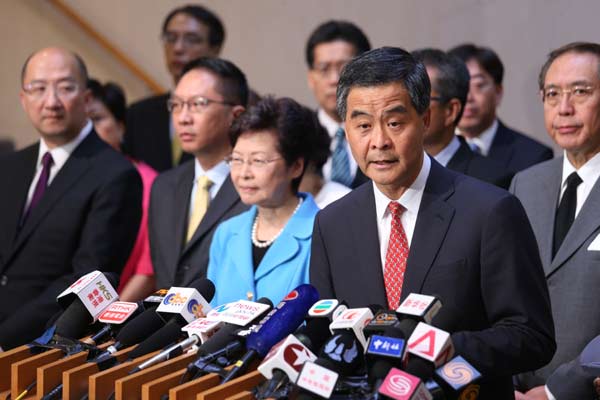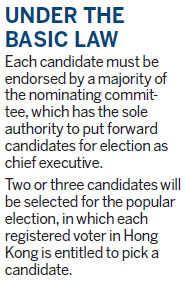Rules set for HK chief vote
By Kahon Chan in Hong Kong (China Daily) Updated: 2014-09-01 07:43
 |
|
Chief Executive CY Leung and other senior Hong Kong officials meet the media after the decision was announced on Sunday. [Photo by Edmond Tang / China Daily] |
|
Sound Bites The opposition must be mindful of Hong Kong's future development and not veto the constitutional reform package. They must realize that it's no good for the democratization process to stand still as the people look forward to electing the next CE through universal suffrage. Tam Yiu-chung - Legislative Council member and chairman of the Democratic Alliance for the Betterment and Progress of Hong Kong Following the NPCSC decisions on the electoral method, there's still much room for discussion at the local legislation level. The democratic process will not come to a sudden halt. Universal suffrage can be achieved under a gradual and orderly process. All sides should keep calm and sit down to talk. Rita Fan Hsu Lai-tai - Hong Kong deputy to NPC Hong Kong's pursuit of universal suffrage for the election of the chief executive has made a great leap forward. The NPCSC's decision to have two to three candidates in the race will ensure keen competition and Hong Kong people will certainly have real choices. Regina Ip Lau Suk-yee - chairwoman of the New People's Party and former secretary for security The NPCSC resolution is a major step for Hong Kong's democratic development. The SAR government should launch the second stage of the political reform consultation as soon as possible to give Hong Kong people time for thorough discussion. The resolution may not be perfect for some people, but they must understand that this is not the final arrangement. "Democracy is not to be achieved in one go, nor should it be unchangeable. It should keep improving with social development. There is still room for continuous perfection for the electoral arrangements." Henry Tang Ying-yen - CPPCC Standing Committee member and former chief secretary |
Voters in the special administrative region can then pick their leader from those candidates, the standing committee ruled in a legally-binding resolution passed unanimously by the top legislature.
Zhang Dejiang, chairman of the standing committee, said that the resolution was significant for the implementation of the "one country, two systems" policy and the gradual democratization of Hong Kong
The top legislator appealed for rational discussion and concerted effort from Hong Kong people to realize the goal of universal suffrage in the 2017 election for chief executive.
Under the Basic Law, the nominating committee has the sole authority to put forward candidates for election as chief executive.
The committee must be consistent with the size, composition and methods of choosing its members with the electoral committee that chose the current chief executive in 2012.
Each candidate must be endorsed by a majority of the committee. Two or three candidates will be selected for the popular election, in which each registered voter in Hong Kong is entitled to pick a candidate.
The winner of the election will be subject to appointment by Beijing.
The Hong Kong government will now draft a detailed election proposal and consult the public in the coming months. A resolution detailing the reform will be given to the Legislative Council in the first quarter of next year.
 |
- Legal experts welcome Hong Kong decision
- Govt's leadership of HK political reforms supported
- NPC decision a landmark in HK democratic development
- Hong Kong's political realities
- Growing storm looms over Hong Kong's economy
- Final reflections on Hong Kong SAR political reform
- Lawmakers stress Basic Law in HK electoral reform
- Govt encourages people to work 4.5 days a week
- Action to be taken as HIV cases among students rise
- Debate grows over reproductive rights
- Country's first bishop ordained in 3 years
- China builds Tibetan Buddhism academy in Chengdu
- Authorities require reporting of HIV infections at schools
- Typhoon Soudelor kills 14 in East China
- Police crack down on overseas gambling site
- Debate over death penalty for child traffickers goes on
- Beijing to tighten mail security for war anniversary







